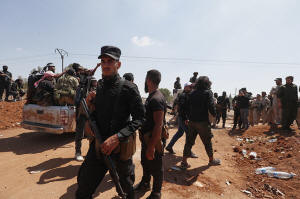Syria's armed Bedouins say they have withdrawn from Druze-majority city
after weeklong fighting
[July 21, 2025]
By GHAITH ALSAYED and KAREEM CHEHAYEB
MAZRAA, Syria (AP) — Syria's armed Bedouin clans announced Sunday they
had withdrawn from the Druze-majority city of Sweida following weeklong
clashes and a U.S.-brokered ceasefire, as humanitarian aid convoys
started to enter the battered southern city.
The clashes between militias of the Druze religious minority and the
Sunni Muslim clans killed hundreds and threatened to unravel Syria's
already fragile postwar transition. Israel also launched dozens of
airstrikes in the Druze-majority Sweida province, targeting government
forces who had effectively sided with the Bedouins.
The clashes also led to a series of targeted sectarian attacks against
the Druze community, followed by revenge attacks against the Bedouins.
A series of tit-for-tat kidnappings sparked the clashes in various towns
and villages in the province, which later spread to Sweida city, the
provincial capital. Government forces were redeployed to halt renewed
fighting that erupted Thursday, before withdrawing again.
Interim President Ahmad al-Sharaa, who has been perceived as more
sympathetic to the Bedouins, had tried to appeal to the Druze community
while remaining critical of the militias. He later urged the Bedouins to
leave the city, saying that they “cannot replace the role of the state
in handling the country’s affairs and restoring security.”
“We thank the Bedouins for their heroic stances but demand they fully
commit to the ceasefire and comply with the state’s orders," he said in
an address broadcast Saturday.
Dozens of armed Bedouin fighters alongside other clans from around the
country who came to support them remained on the outskirts of the city
and were cordoned off by government security forces and military police.
They blame the clashes on the Druze factions loyal to spiritual leader
Sheikh Hikmat al-Hijri and accuse them of harming Bedouin families.

“We will not leave until he turns himself in alongside those with him
who tried to stir sedition. And only then will we go home.” Khaled
al-Mohammad, who came to the southern province alongside other tribesman
from the eastern Deir al-Zour province, told The Associated Press.
Aid convoys enter Sweida but tensions persist
The Bedouins' withdrawal brought a cautious calm to the area, with
humanitarian convoys on their way. The Syrian Red Crescent said Sunday
it sent 32 trucks loaded with food, medicine, water, fuel and other aid,
after the fighting left the province with power cuts and shortages.
Syria's state news agency SANA reported that the convoy entered Sweida
on Sunday, but accused al-Hijri and his armed Druze supporters of
turning back a government delegation that accompanied another convoy.
The Foreign Ministry in a statement said the convoy accompanying the
delegation had two ambulances loaded with aid provided by local and
international organizations.
Al-Hijri did not directly respond to the accusations but said in a
statement that he welcomes any assistance for Sweida and slammed what he
claims were distorted campaigns against him.
[to top of second column]
|

Syrian government security forces block Bedouin fighters,
background, from entering Sweida province, in Busra al-Harir
village, southern Syria, Sunday, July 20, 2025. (AP Photo/Omar
Sanadiki)

“We reaffirm that we have no dispute with anyone on any religious or
ethnic basis," the statement read. "Shame and disgrace be upon all
those who seek to sow discord and hatred in the minds of young
people.”
The U.N. International Organization for Migration said 128,571
people were displaced during the clashes, including 43,000 on
Saturday alone.
US envoy appeals for an end to fighting
Washington's special envoy to Syria, Tom Barrack, said the clashes
and atrocities “overshadowed” an initial cautious optimism about the
country's post-war transition and the international community's
lifting of sanctions.
“All factions must immediately lay down their arms, cease
hostilities and abandon cycles of tribal vengeance,” Barrack said on
X. “Syria stands at a critical juncture — peace and dialogue must
prevail — and prevail now.”
Among those killed in the weeklong fighting were dozens of Druze
civilians slain in a series of targeted attacks in the city at the
hands of Bedouin fighters and government forces. Videos surfaced
online of fighters destroying portraits of Druze religious officials
and notables in homes, and shaving the mustaches of elderly Druze,
seen as an insult to culture and tradition. Druze militias in return
attacked Bedouin-majority areas in the outskirts of the province,
forcing families to flee to neighboring Daraa province.
More than half of the roughly 1 million Druze worldwide live in
Syria. Most of the other Druze live in Lebanon and Israel, including
in the Golan Heights, which Israel captured from Syria in the 1967
Mideast War and annexed in 1981.
Syria's Druze largely celebrated the downfall of the Assad family
that ended decades of tyrannical rule. While they had concerns about
Al-Sharaa's de facto Islamist rule, a large number wanted to
approach matters diplomatically. Al-Hijri and his supporters,
though, have taken a more confrontational approach with Al-Sharaa,
contrary to most other influential Druze figures. Critics also note
al-Hijri's previous allegiance to Assad.
However, the recent clashes and sectarian attacks on the minority
community have made a growing number of Druze in the area more
skeptical about Damascus' new leadership and more doubtful of
peaceful coexistence.
——
Chehayeb reported from Beirut.
All contents © copyright 2025 Associated Press. All rights reserved
 |